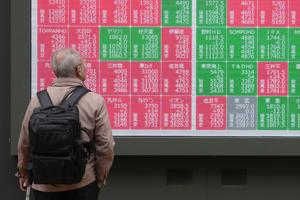Asian shares experienced an upward trend on Tuesday, buoyed by a strong performance in U.S. stocks, driven by increasing optimism regarding potential interest rate cuts by the Federal Reserve. This rally in the U.S. markets has instilled confidence among investors across the region, although futures for U.S. stocks dipped slightly and oil prices saw a decline.
Tokyo’s Nikkei 225 index remained nearly unchanged, closing at 48,628.85 after a holiday break. However, the market faced pressure from a significant drop in shares of technology giant SoftBank, which fell 10.3% amid concerns that its substantial investments in OpenAI might be threatened by the launch of Google’s new Gemini artificial intelligence model. In South Korea, the Kospi index rose 0.3% to 3,859.12, while Taiwan’s Taiex surged 1.5%. Chinese markets also recorded gains, with Hong Kong’s Hang Seng climbing 0.4% to 25,821.47 and the Shanghai Composite index increasing 0.9% to 3,872.45. Notably, e-commerce giant Alibaba saw a 1.6% rise in anticipation of its earnings report later in the day.
Australia’s S&P/ASX index rebounded, closing 0.1% higher at 8,537.00. The U.S. markets are set to close on Thursday for the Thanksgiving holiday, followed by the busy shopping days of Black Friday and Cyber Monday.
The rally in U.S. markets on Monday marked one of their best days since summer, with the S&P 500 climbing 1.5% to 6,705.12. The Dow Jones Industrial Average increased 0.4% to 46,448.27, while the Nasdaq composite surged 2.7% to 22,872.01. This surge was attributed to growing expectations that the Fed will lower its main interest rate in December, a move that could stimulate economic growth and improve investment valuations.
Investor sentiment has been bolstered by robust performances from companies involved in the artificial intelligence sector. Alphabet, praised for its new Gemini AI model, experienced a 6.3% increase, becoming a key contributor to the S&P 500’s gains. Meanwhile, Nvidia saw its shares rise 2.1%.
Despite the recent fluctuations, the S&P 500 remains within 2.7% of its record high set last month. A significant test for the markets is set to take place on Tuesday, when the U.S. government will release inflation data for September. Economists predict a 2.6% year-over-year increase in wholesale prices, consistent with August’s figures. A higher-than-expected inflation report could hinder the Fed’s plans to implement a rate cut for the third time this year, as lower rates may exacerbate inflationary pressures.
Some members of the Fed have already expressed reservations about a potential rate cut in December, citing persistent inflation above their 2% target. Nevertheless, traders remain optimistic, with a nearly 85% probability that the Fed will reduce rates next month, an increase from 71% on Friday and significantly higher than the less than 50% chance seen just a week ago, according to data from the CME Group.
In early trading on Tuesday, U.S. benchmark crude oil prices fell, with a decline of 25 cents to $58.59 per barrel. The international standard, Brent crude, dropped 30 cents to $62.42 per barrel. The U.S. dollar decreased to 156.70 Japanese yen from 156.91, while the euro slipped to $1.1517 from $1.1521. Bitcoin also faced a decline, falling 1.1% to $88,100, down from nearly $125,000 last month.
As markets continue to navigate these changes, investors are keeping a close eye on economic indicators and central bank decisions that could shape the future landscape.







